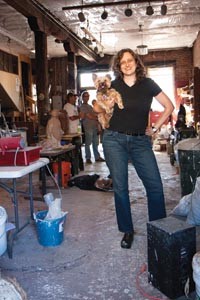Sherrie Flick has made her bones nationally writing short, concise pieces of flash fiction, including the 2004 chapbook I Call This Flirting. She's also been an instrumental part of the Pittsburgh literary scene, as artistic director of the popular monthly Gist Street Reading Series, which draws national and local talent.
Now Flick's first novel, Reconsidering Happiness, is out on University of Nebraska Press. The book, told in a series of vignettes from different characters in different locations -- all linked through love, friendship, sex and baked goods -- has the intimate and looping feeling of a late-night heart-to-heart with a best friend.
It follows two young women, Vivette and Margaret, at the height of the Doc Martens-and-flannel era. Their lives had briefly intersected while they worked at a small-town New England bakery; they catch up later, years after Margaret has left and weeks after Vivette has. Margaret is married and lives on a farm in Nebraska, while Vivette and her Buick are at loose ends after an unlikely affair.
Together for an uncomfortable week at Margaret's farm, peripatetic and immature Vivette seeks wisdom, while Margaret is confronted with her own uneasy version of peace. It's the kind of reflective peek into the lives of fascinatingly ordinary people that makes you miss them when you finish reading.
In her Booklist review of Reconsidering Happiness, Leah Strauss wrote, "this introspective, conversational, travelogue-like novel captures the pensive force driving the two women's personal journeys, and how the women are illuminated by sparks of reconciliation along the way."
Flick, a native of Western Pennsylvania, lives on the South Side Slopes.
Why are departures a central theme in the book?
I went to grad school in Nebraska sight unseen from San Francisco. I was very disoriented, I didn't know much about it. I thought it'd be cool. I was reading about pioneer women and thinking, "Who leaves and who stays? Who got on the Mayflower? Who got on the prairie schooner and left everything behind?" For some, home is the roving, it's the moving. It wasn't even so much a choice as an impulse -- you were just programmed to leave. It's not running away. It's the idea of a contemporary pioneer.
With women, leaving is a big deal, the whole idea of safety. Pioneers, they discover new stuff. Vivette and Margaret are these contemporary pioneers.
Regional differences play a role, too.
I do think that within the U.S. we have all these different cultures, and if you've traveled around a lot and been able to live in a bunch of different parts of the U.S., you start seeing how culture affects personality. What does it mean when a New Englander is plopped on the Great Plains? It's a conflict.
The novel is a clear snapshot of the U.S. in the mid-'90s. Why that era?
I find that time-period interesting -- there was a really thriving underground music scene. There was an underground culture that's become way more accessible with the Internet.
Generation X [included] a lot of people out roving around trying to figure out what to do next. There was a whole Boston scene not connected to the Seattle scene. It was important for the book to be set pre-cell phone, pre-blog. The idea of leaving, of driving away, it was much more of a risk. It was lonelier. You wouldn't be in touch with the people you've left.
The story's New England bakery is staffed entirely by women whom half the town is in love with. Did it have to be women? Why a bakery?
For about six years I was a baker. I baked through college and for a few years after. I had this wonderful experience of working with older women. When you work at a place that's the hub -- that's a hard thing to negotiate in a small town. I don't think it's exclusive to women. There is a certain type of guy who's attracted to that type of collaborative work -- in baking, you hardly ever finish what you start. I start the bread, my shift ends. ... Adding a man would have created conflict, it would have been a red herring.
The story doesn't have a fairy-tale ending. Is it a sad book?
It's not an ecstatic book. It's contemplative. It's really examining a kind of loneliness, the loneliness that exists even when you're happy. I think there is a kind of beauty to that kind of loneliness. You learn about yourself. You have a time to be introspective. It creates a kind of longing -- that is definitely part of what I was trying to capture.
A novel is a major departure from flash fiction. How did you adapt?
I was learning as I went. Flash fiction tends to use short, concise sentences. I had to practice writing longer sentences with momentum. I've been sold on the form. It's really challenging. You get so lost in the project. I have a second novel started. I feel like this is a little easier. I feel a little bit more confident.
Sherrie Flick reads from Reconsidering Happiness 8 p.m. Wed., Sept. 16 (The New Yinzer Presents, ModernFormations Gallery, 4919 Penn Ave., Garfield; $5 or pot-luck donation; www.tnypresents.blogspot.com).


